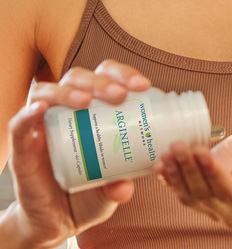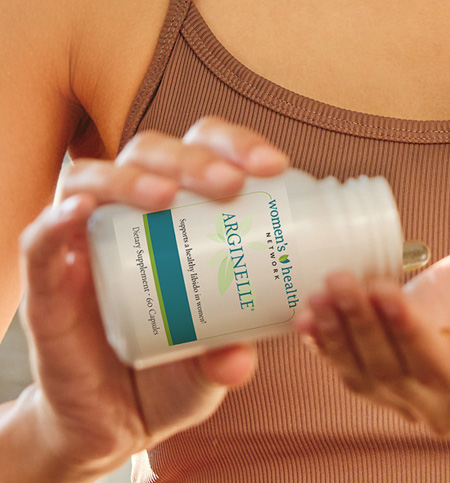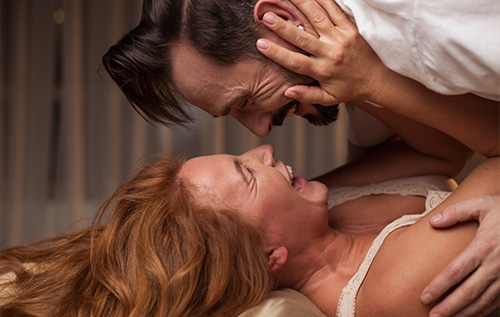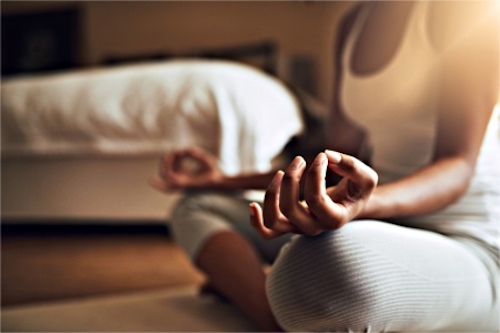Welcome to Sexology 101 — our ongoing article series devoted to sexual health. Our goal is to provide answers to your questions with information about libido, masturbation, partner issues, orgasm and more. Women’s Health Network celebrates the idea that satisfying sexual activity can be an integral, health-enhancing element of every woman’s life at every age.
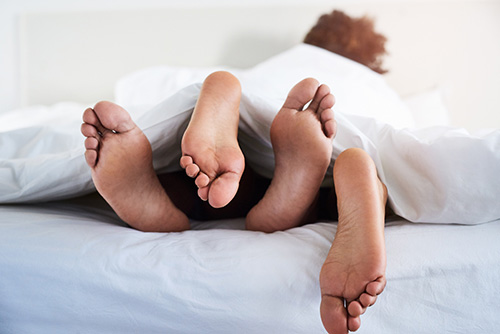
In this article:
SPECIAL NOTE FROM WOMEN’S HEALTH NETWORK: the following article is an honest discussion about women’s sexual health that includes adult themes and vocabulary. If you would rather choose an alternate topic, please explore our other women’s health articles.
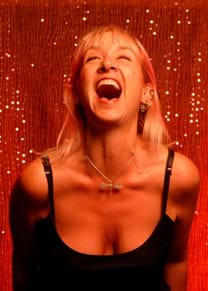
Meet Barbara Carrellas!
Barbara is an author, sex educator, university lecturer, sex/life coach, motivational speaker and theater artist. Her most recent books are Urban Tantra: Sacred Sex for the Twenty-First Century and Luxurious Loving: Tantric Inspirations for Passion and Pleasure. She is the founder of Urban Tantra® which she describes as “a way to bring people together to explore the vast range of sexual, spiritual and emotional possibilities open to all of us.”
Many women are struggling to overcome their preconceived, cultural notions about sex, and it seems clear that our society still doesn’t promote the idea that sex is normal and healthy for women and girls. And we certainly aren’t taught that it can be a fun, creative aspect of total wellness!
So we had a conversation with Barbara Carrellas, a sex expert and facilitator. Through her workshops, lectures and coaching, Barbara encourages women to set off on their own “life-changing adventures in the infinite realms of sex and spirit.”
Changes in libido — remind yourself what you love about sex
Too many women feel their sex lives are nonexistent, or that their libidos are long lost. Worse, some say they have no hope — or desire — of rediscovering the joy, satisfaction and stress relief that sexual activity provides. A woman in perimenopause or menopause may say, “I used to be interested in sex. But my libido has gone somewhere.”
Many women say they used to love sex and that for years, it had been a major part of their lives — something they looked forward to, and saved the time and energy for. But now they couldn’t care less if they’re touched at all. They have absolutely no sex drive, and ask, “Is it my hormones? Is it testosterone or reduced estrogen? What? Something is different — what’s wrong with me?” Let’s hear how Barbara answers that question:
Barbara Carrellas: I’ve started asking (these women) a new question: “Why did you have sex? What did you like about it? What was the big pay-off?”
And their answers tell me what the reward was in sex, what the yum was about it. People say at first, “Oh, well, you know, like everybody.” When I say, “Yeah, what is that?” They answer, “Well… you know.” Finally, they might say, “I do it because I like the intimate connection with the partner.” That’s one answer. Some people thought it brought them home to themselves, and grounded them. Other people did it for the adventurous feeling of it. Some people loved sex because they felt it connected them with God, or “the infinite.” Others liked sex because it made them feel ego-less. So there are all these different answers as to why people had sex.
Barbara’s Best Ideas: Pump up the volume on sensuality
Make a sensual or erotic date with yourself — to help open up to new erotic possibilities. It can be a very powerful way to jumpstart a sensual awakening because as we know, energy follows thought:
- Buy a wonderful, exotic meal for one. Focus totally on the food, savoring each morsel — no reading a book or talking on the phone while you eat.
- Go see an exhibit of erotic photos or buy a great book of erotic stories. Slow down and take your time absorbing the content.
- Take a walk in a beautiful natural location that inspires you and triggers multiple senses.
- Take a long, sensual, scented bath by candlelight. Don’t rush even one moment in your “sensual sanctuary.”
Once I know the reasons why somebody had sex, I can get deeper and say, “Okay, then, if that’s such a big pay-off, why do you think you might not be wanting it now?” And that opens up a whole new avenue of questioning, and you get a lot more information about what else is going on in their lives, about how their bodies feel, about what their relationships are like, about whatever has changed.
Defining ecstasy
Hormonal fluctuation is often partly to blame for their lowered libido. But something else often shifts in menopause, and it’s not just hormones. Women may think, “This is just what menopause is like,” or “Once you’re in your 60s you never have sex anymore anyway.” Their desire seems to have just vanished. Barbara, how do we guide women who have absolutely no desire for sex?
BC: For some women, I find that I need to give them permission to say “no” because otherwise they feel broken and not normal. But then I ask, “Well, is it a problem for anyone else around you? Is there somebody around you who’s pressuring you for sex?” Because then we have to look at that dynamic in the relationship.
But if a woman says, “I just can’t find a turn-on anywhere — not with a flashlight, not with a magnifying glass — nothing! What do I do?” I say, “Well, let’s put sex and orgasm in the realm of ecstatic experience.” The human body–mind–spirit craves ecstatic experience. Ecstatic doesn’t just mean, “Oh, wow, that feels greeeaaat!” Ecstatic means having a cathartic, earth-shattering, dissolving-the-self kind of big feeling to it, and can be a combination of all sorts of emotional and physical release and expression.
Sometimes I ask, “Well, is there any ecstatic expression somewhere in your life?” And someone might say, “Well, I used to love to dance.” Now we’re getting somewhere; we’re getting to a body-based thing — a way in. “What kind of dance did you like to do? Could you do more of that?”
Rediscovering your “sensual identity”
For the women who have lost the connection to their physical, and especially their sexual, selves the trip back to sexual awareness may be very hard to map. They may simply not know where to start. Here’s what Barbara suggests:
BC: My goal is to bring people back to their bodies in a way that is yummy for them, and start to reconnect. I’m trying to reconnect their ecstatic pathways, specifically physical ones. Some people can get there spiritually. If they can find a place of ecstasy somewhere in their lives, it will often wake up the system and sex becomes a logical extension of the desire for the ecstatic experience.
Dr. Mona Lisa Schulz (behavioral neuroscientist and medical intuitive) says that in the temporal lobe of the brain, emotions, sexuality, spirituality and intuition are all connected. So when we light up that area of the brain for one purpose, we frequently turn on one for another. And people say, “Well, I wish I could connect my spirituality with my sexuality with my emotions with my intuition.” But they’re already connected!
It’s really the fact that we have been told by society to keep them all separate. One of the reasons people stop having sex is that it is so limiting in our culture. For a married couple, it’s essentially: penis + vagina, with a little oral sex thrown in or a little 1-2-3 erogenous zone warm-up. It’s boring!
My book, Luxurious Loving, is based on the senses. Deconstructing sex helps us to see all of its components, and then we can decide which parts turn us on. For instance, some people really love touch. Other people would rather be surrounded by beautiful aromas — the sense of smell really does it for them. Others are more visual.
To help people connect with their sensual selves I ask, “What sense seems to be the hottest for you?” And once I find that out, we make a list of ways to erotically fulfill that sense. I love the book The Artist’s Way, by Julia Cameron. If you replace the word “artist” in Julia’s book with “erotic” or “sensual,” you have a great manual for the senses.
The erotic impulse does go to sleep if we don’t use it, or if we’re bored. I like waking up both the erotic mind and the erotic body, and the good news is, with a little bit of an effort to become more sexual, sensual or erotic, the body wakes up and responds.
Saying yes to masturbation
In most circumstances, masturbation can be a wonderful — and exceptionally safe — way to reawaken your sexuality, whether you have a partner or not. When we first bring the topic up with some women — they’re shocked and worried about the whole notion of masturbation. “Is it okay?” “What does it say about me, if I do masturbate…?”
Barbara’s Best Ideas: Self-love and “medibation”
“Schedule 15-minute self-loving sessions with yourself every day and masturbate to orgasm. After orgasm, lie there in meditation. It’s amazing, the wisdom that comes through at that moment. Let’s call it ‘medibation.’ You can medibate about where to go next, sensually. Or you can medibate on a problem you’re having. Medibation is — ah! — it’s one of my favorite practices! I recommend it to everybody!”
We agree with Barbara that just letting women be shocked by the idea for awhile can actually be helpful. Because just thinking about it helps them get used to the word and the concept itself. So when we talk a little more about masturbation and its health benefits — both emotional and physical — most women will hear us out. Once you understand that masturbation is completely normal, that it allows you to experiment and explore, and that it can be totally private, it sets the stage for developing a new sexuality, one that fits who you are now. Barbara agrees:
BC: I advise people to develop a really strong “self-loving” practice. If having good self-esteem is great, then why isn’t loving yourself physically great? That’s how I find out what a woman’s objection or negative thought is to masturbation. It helps to know that other people your age do it, too, and that sales of vibrators and sex toys to the older population are high. You’re not alone.
The fact that we don’t talk to each other about sex is a big part of the problem. We don’t know how to find out more about sex because we never learned that subject in school. We are like pre-K around sex.
Many people think masturbation is for people who don’t have partners or that it’s “wrong.” But I think self-loving is (a divine) gift to all of us. And if you don’t know how to be sensual or sexual with yourself, how do you expect to be good at it with another person? Masturbation helps you make the connection between your sexuality and your heart — often this link is broken, damaged or weak. So just try it. I think you’ll like it.
Barbara’s Best Ideas: If you have a partner who’s unwilling or unable…
- Sex is play. I tell people to go into the kitchen and find six “pervertables” — six things you can make into sex toys or sensation-producing devices. Note: they don’t have to be insertable!
- We get very hung up about what doesn’t work the way it used to work, or what “the magazine” said it was supposed to look like. There are an infinite number of erotic possibilities. And there are lots and lots of books and videos.
- Let’s get over the notion that sex is penis-vagina-intercourse, and that’s all. In the totality of erotic possibilities, penis-vagina-intercourse is one-tenth of one-hundredth of 1%. In the big universe, a lot of other things are sex.
- Erect penises are not required for a fabulous sexual experience. How about learning erotic massage which can be done on a non-erect penis? It still feels wonderful, especially if combined with breath and energy techniques.
On my website, BarbaraCarrellas.com you can find downloadable sex education videos.
If you don’t have a partner
We often hear from women who tell me that their libidos are just fine — it’s the partner that’s missing! Masturbation is part of the answer for these women, but with a few special instructions from Barbara:
BC: For a woman who doesn’t have a partner, I suggest that she master the art of self-loving. I use this wonderful exercise I learned years ago from author and sex expert Margo Woods:
Masturbate almost ‘til you orgasm, but not quite. Bring that energy up to your heart, and then — just be with it. When the energy starts to dissipate, masturbate again almost to orgasm, and just before you’re going to orgasm, bring the energy up to your heart again. Do it again for a third time but this time let yourself orgasm. Now the energy will shoot up to your heart and it is such a lovely feeling of reconnection, it sometimes helps people get over their embarrassment, their reticence or their judgments about self-loving. It works.
The big “O” — wonderful and thrilling but sometimes elusive
Over the years at Women’s Health Network, we have shared all the cultural and personal changes that women have experienced as sexual beings across their lifespan. One of the recurring themes is “orgasm” — how to achieve it and whether it is an essential element to our sexual identities. Barbara shares her unique perspective on orgasm:
BC: I think a lot of women who haven’t had genital orgasms believe on some level that it’s never going to happen, so it never happens. We need to look at orgasm as a much bigger event. It’s not just a release of tension and a feel-good that happens when clitorises or penises are stimulated. For me, an orgasm is an expansion of energy that’s flowing through the entire body, mind and leading us to spirit.
I believe in “emotion-gasms.” When somebody says she hasn’t had an orgasm, I say, ’Okay, I hear you. You haven’t had a genital orgasm. But have you ever laughed so hard that the laugh was ’doing you’ to the point where you wondered if you were going to get your next breath? You didn’t even remember what you were laughing about, you were just laughing?” And people go, “Yeah! Yeah!” And I say, “Okay, how did you feel after that?” “Oh, well, like, totally wasted and giddy,” and I say, “Well, that’s kind of the feeling you get after an orgasm. So, let’s call that a giggle-gasm. You’ve had one of those.”
If you take orgasm apart as if it were a layer cake, you find out that the ingredients are not just genital stimulation, or even erogenous zone stimulation. It’s breath. It is squeezes of the entire pelvic floor. It’s the brain, and imagination of what’s going on and where the energy is moving. It’s sound. It’s movement. All those things make up an orgasmic experience. You can even have an orgasm without [the] clitoris or penis being involved.
Reinventing your approach to have better sex and much, much more fun
There is a common perception that as you get older, the goal of peak sexual experience becomes less important. But intimate encounters during midlife — and beyond — can become the most spectacular chapters of a woman’s sex life. Barbara explains how you can create a new vision for your own sexual experiences:
BC: I subscribe to [the] Jack Morin theory in his book, The Erotic Mind. It’s about finding the right balance of safety and risk — or you can use the word adventure… something a little dangerous. Because if I tell people, “Go home and try sensual massage,” there’s no risk! There’s no danger! It’s not exciting! So part of my goal is to find the edge, find the new risk.
By the time we’re 50 or 60 years old, we’ve seen a lot. It’s hard to find something that’s “whoopee!” or challenging and exciting — especially around sex. That’s because sex also brings up fear: “Oh my, I couldn’t do that. That’s too scary.” Or, “My husband would hate that.” Or, “That’s too weird. My friends might find out.”
That’s not the kind of risk I’m talking about. I’m talking about the kind of risk that’s like, “Oooh! That sounds dangerous!” in a good way, or “Oooh, that’s kind of a turn-on….” For example, you could ask your partner, “Do you have any fantasies that would be fun to try out?” And just see what your partner says. You don’t have to play them all out but just hearing each others’ fantasies can be a big turn-on.
You want progress — not perfection!
Getting in touch with your own sensuality and sexuality can — and should — be a satisfying, joyful set of experiences. It’s a journey, and thank goodness there’s some practice and experimentation involved! At Women’s Health Network, we’re dedicated to helping women learn to first talk comfortably about sex. Then know that it’s safe to explore, and to find out what you like, what fits your style and feels right to you. That’s the very beginning of creating a new sexuality for yourself — one that can light up your body, mind and spirit!







